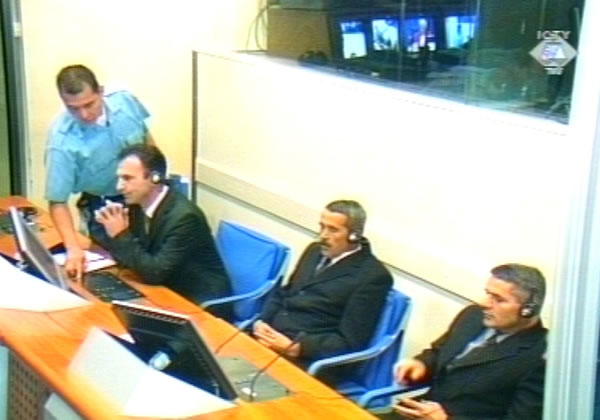Home
ACCUSED OVK MEMBERS PLEAD NOT GUILTY AGAIN
The accused pleaded not guilty to an amended indictment. Three former KLA members are accused of crimes against Serbian and Albanian civilians in the Lapusnik camp in Kosovo
 "Kosovo three" in the courtroom
"Kosovo three" in the courtroom A year after their arrest and transfer to The Hague, the three former members of the Kosovo Liberation Army (KLA) pleaded not guilty to the 10 counts of the amended indictment. They are charged with crimes against Serbian and Albanian civilians committed in the first half of 1998 in the Lapusnik camp near Glogovac.
"I am not guilty, not guilty at all," said the first accused, Fatmir Limaj, former regional OVK commander for Drenica region, known as Captain Celiku, after the judge read out to him the amended counts of the indictment. The other two accused, Isak Musliu and Haradin Bala, pleaded in a similar manner.
The amended indictment introduces a new form of responsibility for all three accused. They are now charged with participation in a "joint criminal enterprise". According to the indictment, the "enterprise" was aimed at the Serbian civilians and Albanians suspected of "collaboration" with Serbs. The victims were unlawfully detained in inhumane conditions, abused, tortured and killed.
In a new count of the indictment, Limaj, Musliu and Bala are charged with torture and cruel and inhumane treatment of the detainees in Lapusnik. This is qualified as a crime against humanity. The killings of more than 20 detainees in Lapusnik – Serbian and Albanian civilians – are charged in the alternative: as a crime against humanity and as violations of laws and customs of war.
Lastly, in addition to individual responsibility, Isak Musliu is charged in the new indictment with the so-called command responsibility for the crimes committed by his subordinates that he failed to prevent or punish.
Fatmir Limaj, who went into politics after the KLA was disbanded – he was a member of the Kosovo Parliament until his arrest – said during the plea hearing that "he did not accept that something like that existed at all" – probably meaning the camp and all the events that the indictment alleges took place there. The presiding judge cut him short, explaining that in the course of the trial the burden of proof will be on the prosecution. They will have to prove whether "that" existed or not and that at this point all that the accused was required to do was to enter his plea.
